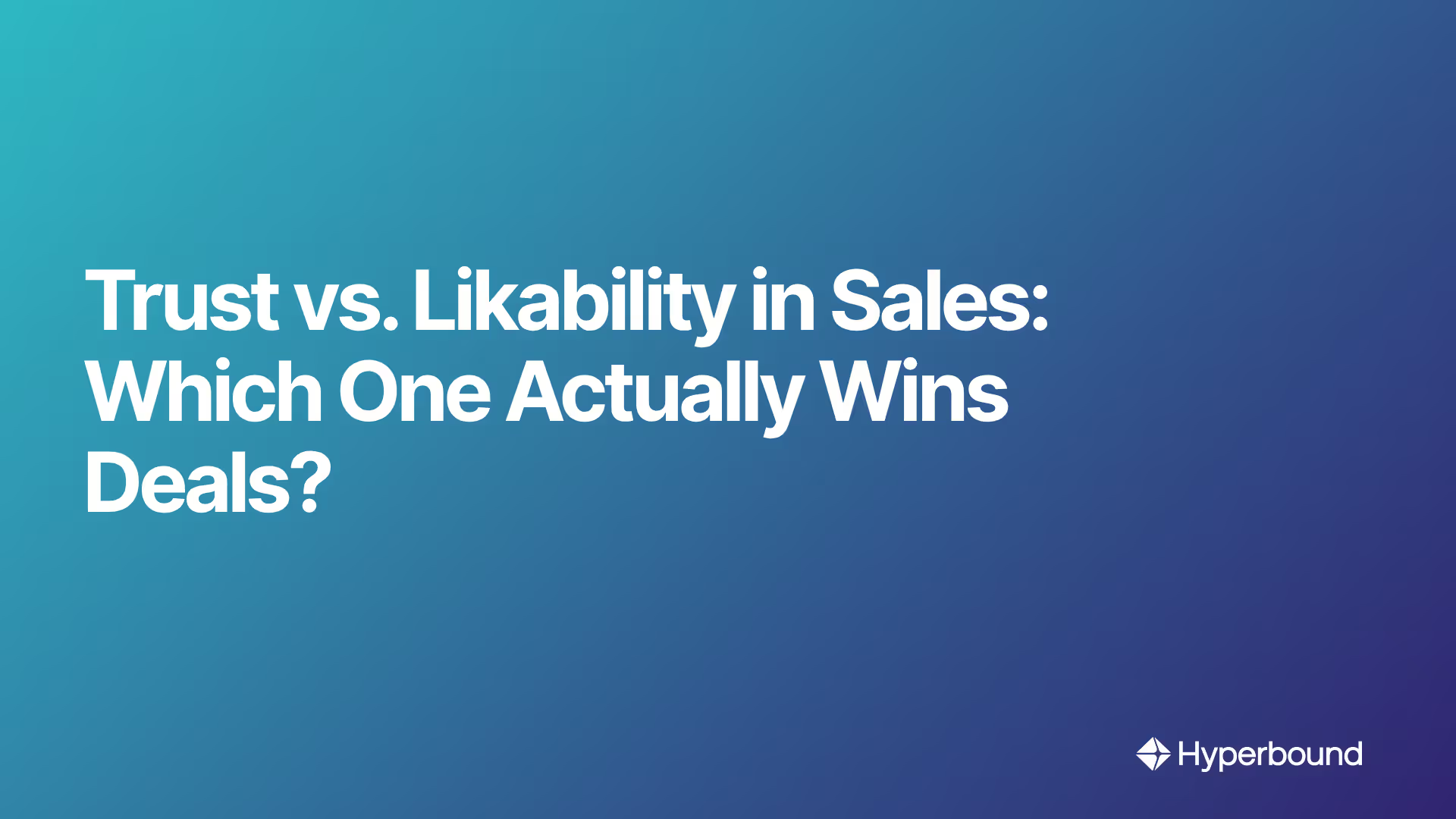
You've heard it a thousand times from sales managers: "You need to build relationships with your prospects." But what does that actually mean? For too many salespeople, this vague advice translates to one misguided goal: become the prospect's friend.
You take them to lunch, laugh at their jokes, find common interests, and work hard to be the most likable person in their inbox. Yet despite all this effort, you're still losing deals to competitors who spent less time on rapport and more time solving problems.
Sound familiar?
The uncomfortable truth is that many salespeople are investing in the wrong currency. In the high-stakes world of B2B sales, being liked isn't enough—and elite performers know this. In fact, research shows that 89% of top-performing salespeople don't believe they need to be liked to succeed, while 86% of underperformers do believe likability is essential.
This article will settle the great sales debate once and for all: trust vs. likability. Which one actually closes deals?
The Great Sales Misconception: Why "Being Liked" Isn't Winning Deals
The fixation on likability is understandable. Social psychology has long recognized the "Liking Principle"—people are more inclined to say yes to those they like. Finding common ground, offering sincere compliments, and maintaining a professional appearance all contribute to building rapport.
But there's a fundamental problem with making likability your north star:
- It can derail your sales process. When you're focused on being liked, you might avoid asking challenging questions that could uncover the prospect's real needs.
- It can make you appear desperate. As one sales professional noted on Reddit, "If you feel you NEED to rely on being liked and being friends with your prospect to sell, then you aren't that good at sales."
- It doesn't address the buyer's primary concern. At the end of the day, B2B buyers aren't looking for a new friend—they're looking for someone who can solve their problems.
A salesperson who's likable but untrustworthy will lose to a less "fun" but more credible competitor every time. When a prospect is about to invest significant resources, they need assurance their investment is safe. This is where trust becomes the non-negotiable foundation.
The Real Currency of Modern Sales: Earning Trust as a Problem-Solver
So what should you be aiming for instead? Becoming a trusted advisor—someone the prospect believes can genuinely solve their problems.
Todd Busler, a sales leader, puts it brilliantly in his viral LinkedIn post: What matters in sales isn't likability, but "Business IQ"—the ability to quickly grasp key business levers that matter to the prospect, challenge their thinking, and offer thoughtful, non-obvious recommendations.
He draws these powerful contrasts:
- "Business IQ > Likability"
- "Challenging them > laughing at their jokes"
- "Solving real problems > rapport building"
- "Pointed questions > dinner at Ruth's Chris"
This perspective aligns with what successful salespeople consistently report: trust is built by challenging, not placating. As one sales professional bluntly put it: "You earn trust by asking tough questions and challenging the prospect on their bs."
In consultative sales, especially when handling key accounts, the ability to respectfully push back and offer genuine insight is what transforms you from a vendor into a valued partner.
A Practical Blueprint for Building Unshakeable Trust
Let's get tactical. Here's how to build the kind of trust that actually wins deals:

1. Communicate with Radical Honesty
Tell customers what they need to hear, not just what they want to hear. According to Inflexion Point's analysis, prospects are naturally cynical about "too good to be true" sales pitches. Be upfront about:
- The complexities of implementation
- Potential challenges they might face
- Where your solution might not be the perfect fit
This counterintuitive approach actually builds credibility. When you're honest about limitations, prospects trust your claims about strengths.
2. Practice Active Listening and Empathy
Go beyond hearing words. Engage fully with what your prospect is saying, paying attention to tone, body language, and emotional cues. Janek Performance Group emphasizes that demonstrating empathy through active listening is critical for relationship management.
- Ask clarifying questions
- Paraphrase to confirm understanding
- Acknowledge concerns without immediately countering them
- Take notes and reference previous conversations
These behaviors signal that you're genuinely invested in understanding their situation—not just waiting for your turn to speak.
3. Establish Expertise and Thought Leadership
To trust you, prospects need evidence that you understand their world better than your competitors. This means:
- Staying informed about industry trends and challenges
- Sharing relevant insights without expectation of immediate return
- Using sales collateral like blogs, whitepapers, and case studies to educate, not just sell
- Ensuring every conversation leaves the customer feeling smarter than before
Modern AI coaching platforms like Hyperbound allow teams to practice delivering these insights through realistic roleplays, ensuring every rep can become a trusted expert.
In value selling, your knowledge is as important as your product. As Inflexion Point notes, "customers need to believe you know what you're talking about."
4. Deliver on Every Single Commitment
Trust is built on a series of kept promises. Throughout the sales cycle, be meticulous about:
- Sending that follow-up email exactly when promised
- Arriving prepared for every meeting
- Delivering demos, proposals, and information by the agreed deadline
- Being transparent when you can't fulfill a commitment and proposing an alternative
Each fulfilled promise is a deposit in the trust bank. Even small commitments matter—they demonstrate reliability and respect for the prospect's time.
5. Leverage Your Network and Social Proof
In today's interconnected business world, trust is also transferred through networks. According to Janek's research, leveraging social proof is a powerful trust accelerant:
- Use social selling strategies on platforms like LinkedIn
- Have relevant testimonials and case studies ready
- Offer references from similar companies or industries
- Share success stories that address concerns similar to your prospect's
Third-party validation provides powerful confirmation that your claims aren't just sales talk.
The Rightful Place for Likability: From Prerequisite to Accelerant
To be clear, I'm not suggesting you should aim to be unlikable. That would be absurd. Instead, it's about understanding likability's proper role in the sales equation.
Think of likability not as the foundation, but as a powerful accelerant to an existing base of trust. Once a prospect trusts your expertise and problem-solving abilities, being likable makes:
- Difficult conversations easier to navigate
- Negotiations smoother and more collaborative
- Customer engagement more pleasant and productive
- The entire sales process more efficient
As Globis Insights notes, likability is "a useful accelerant that can ease the path to closing deals, but cannot replace the necessity of trust."
The key is applying likability ethically to foster genuine connections, not to manipulate. Authentic rapport comes from finding real common ground, not faking shared interests or forcing unnatural conversations.
The Winning Combination in Action
The ideal B2B salesperson is both trusted and liked. Consider this example:
Sarah, an enterprise software rep, was competing against a charismatic salesperson from a major competitor for a large account. The competitor had taken the prospect golfing several times and established a friendly rapport.
Instead of trying to outdo the competitor on likability, Sarah focused on trust. In her second meeting, she respectfully challenged the prospect's implementation timeline, pointing out several dependencies they hadn't considered. This initially created tension, but demonstrated her expertise—a level of poise she'd developed by practicing difficult conversations in AI-powered sales roleplays.
She followed up with a detailed analysis of potential roadblocks and solutions—proving her value as a consultant, not just a vendor. As trust grew, her natural warmth and authentic interest in the client's success made working together pleasant and productive.
Sarah won the deal not because she was more likable, but because she was trusted to deliver results. Her likability simply accelerated the decision-making process once that trust was established.
Win the Deal, Not the Popularity Contest
The data is clear: top performers prioritize trust over likability. They build that trust through expertise, challenging prospects when necessary, and maintaining radical honesty throughout the sales cycle.

This doesn't mean abandoning soft skills or ignoring relationship management. It means reframing the fundamental question from "How do I get them to like me?" to "How do I prove I can solve their problem?"
As one insightful sales professional noted on Reddit, "The relationship comes once they become a customer, not before." Your primary job during the sales process is to lay the non-negotiable foundation of trust that makes a long-term relationship possible.
In transactional sales, this might mean a quick establishment of credibility. In complex B2B sales with key accounts, it involves a sustained demonstration of value and expertise through consultative approaches.
Either way, the principle holds: Trust wins deals. Likability just helps them close faster.
So the next time your manager tells you to "build relationships," remember what that really means: Become the trusted advisor who asks tough questions, challenges assumptions when necessary, and consistently demonstrates the ability to solve real problems.
Do that first, and the relationship—the real one built on mutual respect and proven value—will naturally follow.
Frequently Asked Questions
What is the main difference between trust and likability in sales?
The main difference is that trust is based on a prospect's belief in your competence and reliability to solve their problems, while likability is based on social rapport and friendship. Trust is earned through expertise, honesty, and consistently delivering on promises. Likability stems from finding common ground and being friendly. While likability can make interactions smoother, trust is the fundamental requirement for a prospect to invest in your solution.
Why is trust more important than likability for closing deals?
Trust is more important because B2B buyers are primarily seeking solutions to business problems, not new friends. An investment is a business decision, and buyers need confidence that the salesperson and their company can deliver results. A likable but untrustworthy salesperson will almost always lose to a credible, expert competitor because trust mitigates the buyer's financial and operational risk.
How can I build trust as a salesperson?
You can build trust by consistently demonstrating expertise, communicating with radical honesty, practicing active listening, delivering on all commitments, and leveraging social proof like case studies. This means telling prospects what they need to hear (even if it's difficult), being upfront about your solution's limitations, genuinely understanding their challenges before pitching, and being meticulously reliable.
Does this mean I shouldn't try to be likable?
No, being likable is still valuable, but it should be seen as an accelerant, not the foundation of the relationship. Think of trust as the engine that moves the deal forward and likability as the lubricant that makes the journey smoother. Once trust is established, a positive demeanor can ease difficult conversations and make the overall customer experience more pleasant.
How can I challenge a prospect's thinking without damaging rapport?
Challenge prospects respectfully by grounding your insights in data, industry knowledge, and a genuine desire to help them succeed. Frame your challenges as collaborative questions or alternative perspectives rather than direct criticisms. For example, instead of saying "Your plan is wrong," you could say, "Based on my experience with similar projects, have we considered potential issues with X? I want to ensure we set you up for success."
When in the sales process does likability play the biggest role?
Likability becomes most effective after a baseline of trust has been established. In the early stages, your focus should be on proving your credibility and expertise. Once the prospect trusts that you are a competent advisor, your likability can accelerate the process, making them more eager to work with you over an equally trusted but less personable competitor.
Book a demo with Hyperbound
.png)













